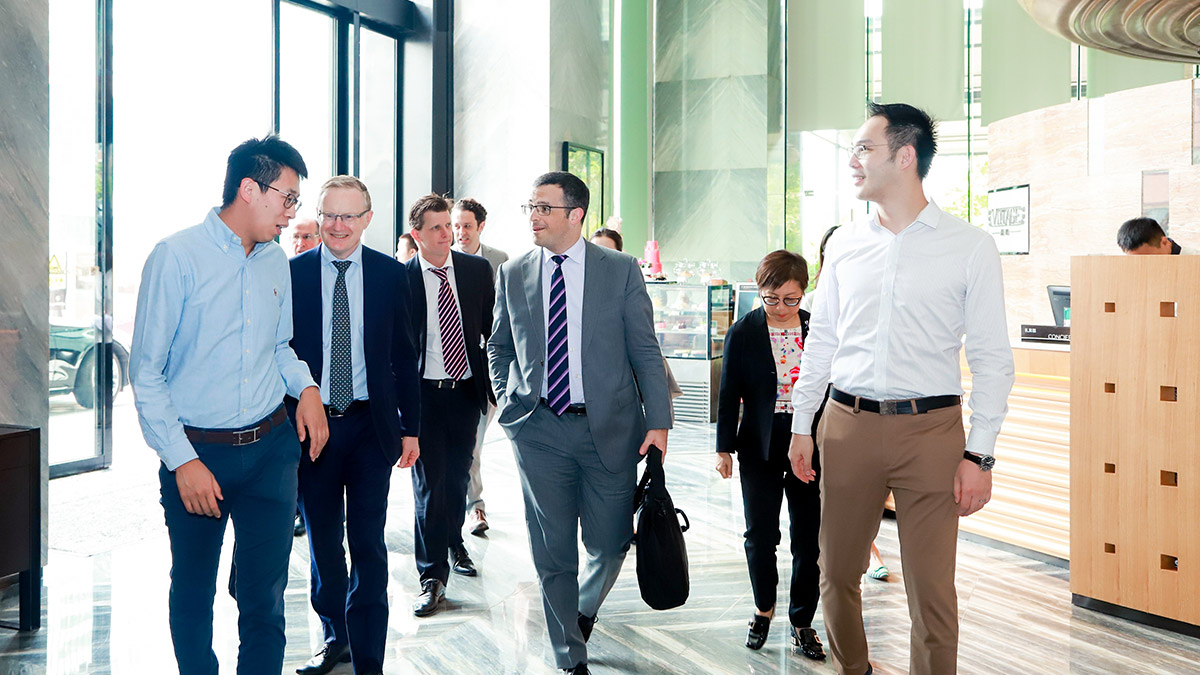The RBA just got together with billion-dollar tech unicorn Airwallex to talk payments

Airwallex CEO Jack Zhang (left) meets with RBA Governor Phil Lowe (2nd from left) in China. (Source: Supplied)
As rates fall while Australia’s rate of economic growth continues to slide, it’s fair to say RBA governor Philip Lowe has a bit on his plate at the moment.
But amid all that, the RBA chief paid a visit to China last week to meet with his regional counterparts for EMEAP — the Executives’ Meeting of Asia-Pacific Central Banks.
Along with interest rates, the RBA also plays a key role in managing Australia’s payments infrastructure. To that end, one topic of discussion at the conference was the possible development of a pan-regional clearing and payments network.
So it makes sense that while he was there, Dr Lowe caught up with the founders of Airwallex — the global payments platform launched out of Melbourne now valued at more than $1 billion.
Speaking with Stockhead, Airwallex CEO Jack Zhang said Dr Lowe was keen to learn from a company who in one sense had already been there, done that.
The company established its business model around more efficient cross-border payments, including a simplified foreign exchange service and algorithms which automate the path of least resistance for cross-border money flows, thus helping to minimise transaction fees.
“He was very specific about understanding how Airwallex built that business, and how we tactically built it as well to grow market share,” Zhang said.
“He also wanted to understand what sort of financial infrastructure we have built, and also how we’re helping Australian businesses expand internationally.”
Dr Lowe and the Airwallex team also the discussed the slow adoption of Australia’s New Payments Platform (NPP) — aimed at speeding up the financial system by enabling businesses and consumers to execute real-time payments.
It’s an area in which the RBA — and fintech competitors — have been critical of the major lenders for a lack of urgency in updating their infrastructure.
“The RBA actually recognised there’s a bit of slowness in the current structure, and they might look at different ways of increasing competition in the NPP space and giving Australian consumers and businesses more benefit,” Zhang said.
Global ambitions
While the discussions with Dr Lowe were mainly focused on improving payments in Australia, Airwallex is still racing ahead with it’s global expansion — and the different technical and regulatory hurdles that come with that.
The company launched its core product in the UK and Europe earlier this year, and is applying for the relevant licences to have a crack at the big US market.
“We’re in the process of getting a money transmitter license (MTL) in the US for each of the different 50 states, and hopefully we’ll get most of them by early next year so we can roll out our product in that market as well,” Zhang said.
Before all that though, Zhang explained that Airwallex built its initial competitive advantage by establishing a foothold in the Asia-Pacific.
A key part of that was the successful application for a financial services licence in Hong Kong, which provided a base to help customers from mainland China get more efficient access to global markets.
“Most of our customers are internet companies, and most of the internet companies in China — when they’re thinking about establishing an international headquarters — they do it from Hong Kong,” Zhang said.
“So because we’re licenced in Hong Kong, we’re helping those internet companies to set up their global financial infrastructure so they can expand internationally — that’s essentially the opportunity we captured.”
Airwallex doesn’t yet have an operating license to process payments from mainland China, and Zhang said the RBA governor also expressed interest in how the company manages that regulatory constraint.
“While our Hong Kong license is a key resource for the company, we are excited and open to discussions with PBOC with the goal of improving the efficiency of our operation in China,” he said.
Macro risks
For a company at the forefront of cross-border payments, Airwallex also has a unique view of how various macro risks are affecting conditions on the ground — specifically Brexit and the US-China trade war.
Of those risks, Zhang said the uncertainty around Brexit had a more tangible effect as the company tried to expand its business in the UK and Europe.
“It’s definitely impacted a lot of payment companies because we need a contingency plan,” he said.
“For example, Airwallex has been talking to a number of European countries — the Netherlands, Luxembourg, Ireland — to obtain a second EMI (electronic money institution) licence in the event of a hard-Brexit.”
And what about Libra coin? Facebook’s proposed digital currency platform that the internet giant says will improve global money transfers. The concept has a long way to go before regulatory approval, but does Zhang see any disruption from a potential rollout?
“It’s probably more relevant in the peer-to-peer business market, but not really the payments market,” he said.
“Even if they do have a digital currency there’s still going to be a lag in topping up. So when you actually top up a digital currency wallet, you have to convert from other currencies, and when you withdraw it’s vice versa.”
“That top up process will still use traditional payments infrastructure — you can’t avoid that. So I think the digital currency’s not really changing any infrastructure, all it’s doing is adding another currency. The main difference is that currency will probably be more liquid.”
Looking ahead, Zhang and the Airwallex team remain focused on building out their product offering beyond cross-border payments.
Next on the list is an issuance platform, which will allow Australian business to issue a virtual card that instantly connects them with the various providers of services that they’re using.
“We’re also developing a network product for scale, which will allow internet companies to build financial products on top of our infrastructure and build their own financial ecosystem — so basically we become a network ourself,” Zhang said.
UNLOCK INSIGHTS
Discover the untold stories of emerging ASX stocks.
Daily news and expert analysis, it's free to subscribe.
By proceeding, you confirm you understand that we handle personal information in accordance with our Privacy Policy.








